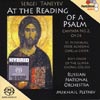Taneyev At the Reading of a Psalm
A performance that does full justice to deeply-felt music
View record and artist detailsRecord and Artist Details
Composer or Director: Sergey Ivanovich Taneyev
Genre:
Vocal
Label: Pentatone
Magazine Review Date: 12/2004
Media Format: Super Audio CD
Media Runtime: 69
Mastering:
Stereo
DDD
Catalogue Number: PTC5186038

Tracks:
| Composition | Artist Credit |
|---|---|
| At the Reading of a Psalm |
Sergey Ivanovich Taneyev, Composer
Andrei Baturkin, Baritone Glinka College Boys' Choir Lolitta Semenina, Soprano Marianna Tarassova, Mezzo soprano Mikhail Gubsky, Tenor Mikhail Pletnev, Conductor Russian National Orchestra Sergey Ivanovich Taneyev, Composer St Petersburg State Academic Capella Choir |
Author: John Warrack
The psalm is No 50 in the King James Bible: ‘The mighty God, even the Lord, hath spoken’. God appears through a storm to denounce those who believe that sacrifices and burnt offerings are of more value than thanksgiving and prayer. It is a powerful psalm, and it made a deep impression on the Slavophile poet and theologian Alexey Khomyakov, whose 1856 poem At the Reading of a Psalm develops the idea that outward forms of religion are as nothing beside truth, brotherly love and ‘a heart purer than gold’. In turn, Khomyakov’s poem inspired Taneyev, who took it for the cantata he completed in 1915, in the last months of his life.
It is in many ways a summation of Taneyev’s life and work, which should by now have earned an English-language study. N Bazhanov’s book (Taneyev; 1971) published in Soviet anti-religious times, skirts lightly round this cantata, while making airy allusions to Handel and Haydn. Here, Francis Maes’s thoughtful booklet-note prefers to suggest comparisons with Beethoven’s approach to sacred words in the Missa Solemnis, especially Taneyev’s use of fugue as symbol of ‘the superior reason dominating the universe’. The most elaborate of these is the triple fugue that concludes the first of the work’s three parts, a compelling piece which tests chorus and recording engineers (in St Petersburg’s Philharmonic Hall) to the limits. Mikhail Pletnev does well to clarify this, and much else in the work, so successfully. The more lyrical, human music includes a fine solo warmly sung by Marianna Tarassova. Taneyev’s strengths are his security of design in the presentation of the poem and his contrapuntal mastery in laying out his material. If this material is seldom of great melodic distinction, the music nonetheless rewards the close listening it demands.
It is in many ways a summation of Taneyev’s life and work, which should by now have earned an English-language study. N Bazhanov’s book (Taneyev; 1971) published in Soviet anti-religious times, skirts lightly round this cantata, while making airy allusions to Handel and Haydn. Here, Francis Maes’s thoughtful booklet-note prefers to suggest comparisons with Beethoven’s approach to sacred words in the Missa Solemnis, especially Taneyev’s use of fugue as symbol of ‘the superior reason dominating the universe’. The most elaborate of these is the triple fugue that concludes the first of the work’s three parts, a compelling piece which tests chorus and recording engineers (in St Petersburg’s Philharmonic Hall) to the limits. Mikhail Pletnev does well to clarify this, and much else in the work, so successfully. The more lyrical, human music includes a fine solo warmly sung by Marianna Tarassova. Taneyev’s strengths are his security of design in the presentation of the poem and his contrapuntal mastery in laying out his material. If this material is seldom of great melodic distinction, the music nonetheless rewards the close listening it demands.
Discover the world's largest classical music catalogue with Presto Music.

Gramophone Digital Club
- Digital Edition
- Digital Archive
- Reviews Database
- Full website access
From £8.75 / month
Subscribe
Gramophone Full Club
- Print Edition
- Digital Edition
- Digital Archive
- Reviews Database
- Full website access
From £11.00 / month
Subscribe
If you are a library, university or other organisation that would be interested in an institutional subscription to Gramophone please click here for further information.




